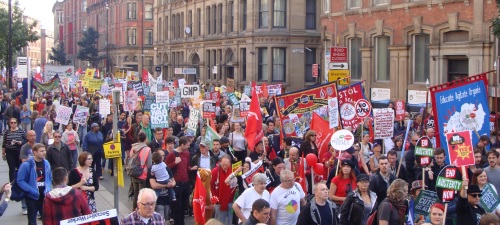 |
| The Greens' manifesto must be read as what MPs will stand up for, rather than expect to implement. |
At a modest launch, the Green Party put forward its manifesto for General Election 2017. The low-key event aligns well with the party's realistically focused, targeted election campaign.
The party's co-leaders, Caroline Lucas and Jon Bartley, have been at the forefront of calls for a Progressive Alliance and local Greens have worked to unite support behind the best placed anti-Tory candidates across the country.
Their own efforts will focus on a few constituencies, to concentrate on re-electing Lucas in Brighton Pavillion and putting some new Green MPs alongside her - such as Natalie Bennett in Sheffield Central, Molly Scott Cato in Bristol West and Vix Lowthion in the Isle of Wight.
So this manifesto must be understood in that context: these are the things that Greens will put on the agenda, that they will speak up for, fight for and vote in Parliament to defend. Openness and cooperation will be key to that effort.
Openness and cooperation appeared in Caroline Lucas' introductory speech, along with compassion, as the values that the Greens will protect. That theme runs through the pledges the party makes in its manifesto.
The headline pledges for the Greens are their commitment to a basic income trial scheme, a shorter working week and a £10 minimum wage. At the core, there is a lot of crossover with Labour: the living wage, higher tax for the wealthy and support for "small businesses, co-operatives and mutuals".
The party, of course, ranks addressing the environment among its highest priorities. There are commitments to fund a public work programme of home insulation to make energy use more efficient, to end fossil fuel subsidies and replace them with investment in renewables and community owned energy, and to protect green spaces.
There is also crossover with Labour here - who, in particular, have called for local public energy companies, with a focus on renewable energy, to compete with the big energy corporations to drive down energy prices.
The Liberal Democrats also share commitments here, to rolling out insulation, to invest in green energy and, with Labour also, to tackle air pollution and support new energy companies coming in and take on the "Big 6" - with a focus on how these efforts could all boost the economy and be the start of a job-creating clean industry in Britain.
These stand in stark contrast to the Conservatives, whose almost only reference to the environment was to offer its support to energy derived from shale gas - otherwise known by its more controversial name of fracking.
On health, the Greens continue their commitment to fighting against privatisation in, and of, healthcare services. They renew their commitment to passing their NHS Reinstatement Bill that would even restore dental services to public funding.
Their focus on support for matching the status of mental health to physical health matches with the Lib Dems and Labour, along with calling for increasing funding for the NHS and social care.
On other public services, the Greens go further than Labour, calling for energy, water, rail, bus and mail services to all be brought back into public ownership - and for an increase to local government funding to help authorities provide good quality services.
There are crossovers on education as well. Scrapping tuition fees has been committed to by the Greens and Labour - and still has support among Lib Dems. Restoring student grants is a Green and Lib Dem priority.
Restoring young people's benefits is a shared goal across the progressive parties. The Greens stand out on welfare, however, for their headline commitment to the basic income and to rolling out a trial scheme.
The Green Party commitments on house building align with all of the progressive parties and specifically matches Labour's commitment to 500,000 new social rent homes over the next five years. Along with the Lib Dems there are commitments to take action on empty homes and to scrap the Bedroom Tax.
Long shared with the Liberal Democrats, and being newly considered by the Labour Party, there is support for the much needed switch to proportional representation - to make votes matter, by making the votes people cast more clearly represented in how the seats in Parliament are distributed.
And not least there are commitments to the Human Rights Act and to the UK's membership of the European Convention on Human Rights - the Tory attitude to which has made this a high priority concern for liberals and human rights and civil liberties groups.
The Greens have only modest electoral ambitions for themselves. But in the face of the threat of a landslide Tory majority they have stressed the need for a Progressive Alliance - for progressive parties to come together to defend their shared values.
While they may be the most humble of mainstream progressive parties, their approach is grasping best the bigger picture. A Tory landslide would be a disaster - for the poorest, for transparency and accountability, for the values of openness, compassion and co-operation.
Whether a supporter of Labour or the Liberal Democrats, if the Greens are the best placed to defeat the Tories in a constituency, there is plenty of crossover to make voting Green tactically an easy decision.
The same extends in the other direction - Greens can find plenty of policies that align with their priorities in the manifestos of the Lib Dems and Labour. There is a real progressive consensus on many issues.
But it is only through cooperation and working together, by voting tactically and campaigning positively in collaboration with the best placed candidates, that progressives can fend off the latest round of Tory assaults on the rights, liberties and wellbeing of the most vulnerable people in Britain.













